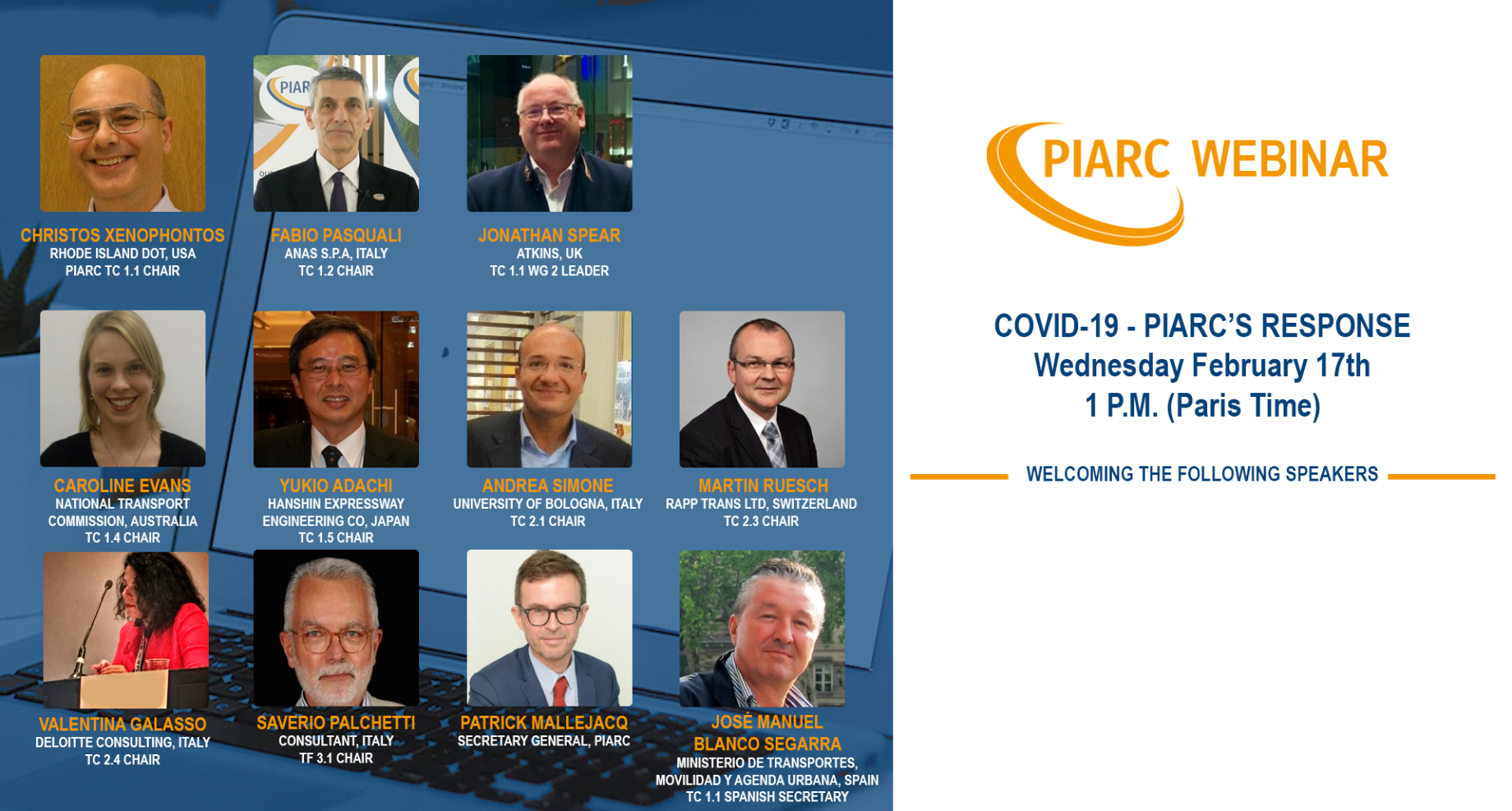Join PIARC’s next webinar and discover its COVID-19 Technical Report!
16th February 2021
In this webinar, the PIARC COVID-19 Response Team will present the detailed Technical Report which was published in December 2020, as well as its lessons learnt and recommendations. The webinar will be held in English on February 17th, 2021.
In this webinar, on Wednesday February 17th, the PIARC COVID-19 Response Team will present the detailed Technical Report which was published in December 2020, as well as its lessons learnt and recommendations.
Active discussions with the audience will be encouraged.
The focus of this Report is on the impacts of COVID-19 on organisations in the roads and transport sector and PIARC’s work in responding. Specifically, it aims to:
- Summarise the aims, activities and outputs of the PIARC COVID-19 Response Team;
- Highlight the programme of PIARC COVID-19 webinars between March and July 2020, what was presented by who, key discussion points arising, and conclusions;
- Set out impacts of, and responses to, COVID-19 from the roads and transport sector in the early stages of the pandemic, based on Response Team activities;
- Highlight lessons learnt and recommendations which may be relevant to the remaining period of the pandemic or to subsequent crises which may arise on an equivalent scale;
- Briefly touch on some of the key issues which may be relevant to economic and social recovery from the pandemic in the coming months and years; and s
- Set out possible lessons which might be considered, to PIARC’s mission, programmes and operating practices, including within the current Strategic Planning Cycle 2020 – 2023.
Speakers include:
- Patrick Mallejacq, Secretary General, PIARC
- Christos Xenophontos, Rhode Island DOT, USA - PIARC TC 1.1 Chair
- José Manuel Blanco Segarra, Ministerio de Transportes, Movilidad y Agenda Urbana, Spain - TC 1.1 Spanish Secretary
- Jonathan Spear, Atkins, UK - TC 1.1 WG 2 Leader
- Fabio Pasquali, ANAS S.p.A, Italy - TC 1.2 Chair
- Caroline Evans, National Transport Commission, Australia - TC 1.4 Chair
- Yukio Adachi, Hanshin Expressway Engineering Co, Japan - TC 1.5 Chair
- Andrea Simone, University of Bologna, Italy - TC 2.1 Chair
- Martin Ruesch, Rapp Trans Ltd, Switzerland - TC 2.3 Chair
- Valentina Galasso, Deloitte Consulting, Italy - TC 2.4 Chair
- Saverio Palchetti, Consultant, Italy - TF 3.1 Chair
The webinar will be held in English.
How do I register?
Register by clicking on the following link. This webinar is free and open to all. The number of seats is limited, and sessions will be managed on a first-come, first-served basis.
When will it be held?
February 17th at 1 p.m. (Paris time)
COVID-19 - PIARC's response
In an effort to share critical, near real-time information on actions taken by road and transport administrations during this crisis, PIARC is rapidly organizing a series of webinars for practitioners and experts to share their experience, knowledge, and some of the most effective responses to COVID-19. While current practices are not yet fully validated and what works in certain regions of the world may not be valid on a global scale, these shared experiences can be valuable tools in managing this crisis, where a good idea now could save lives, improve the resilience of the economy and employment, and minimize service disruptions now and in the future.
